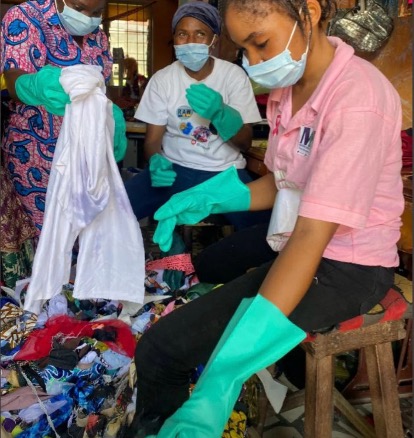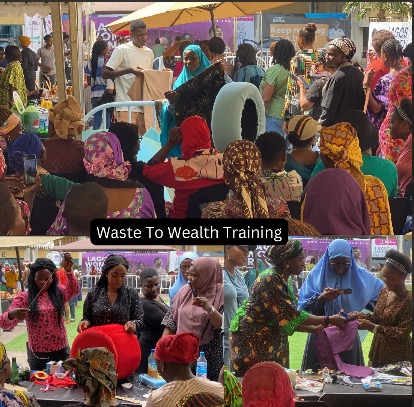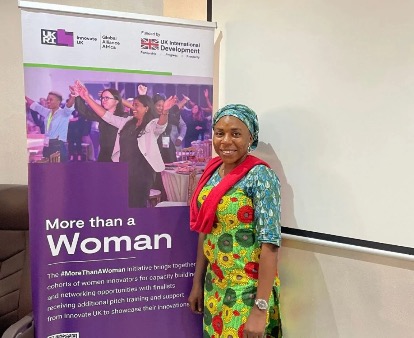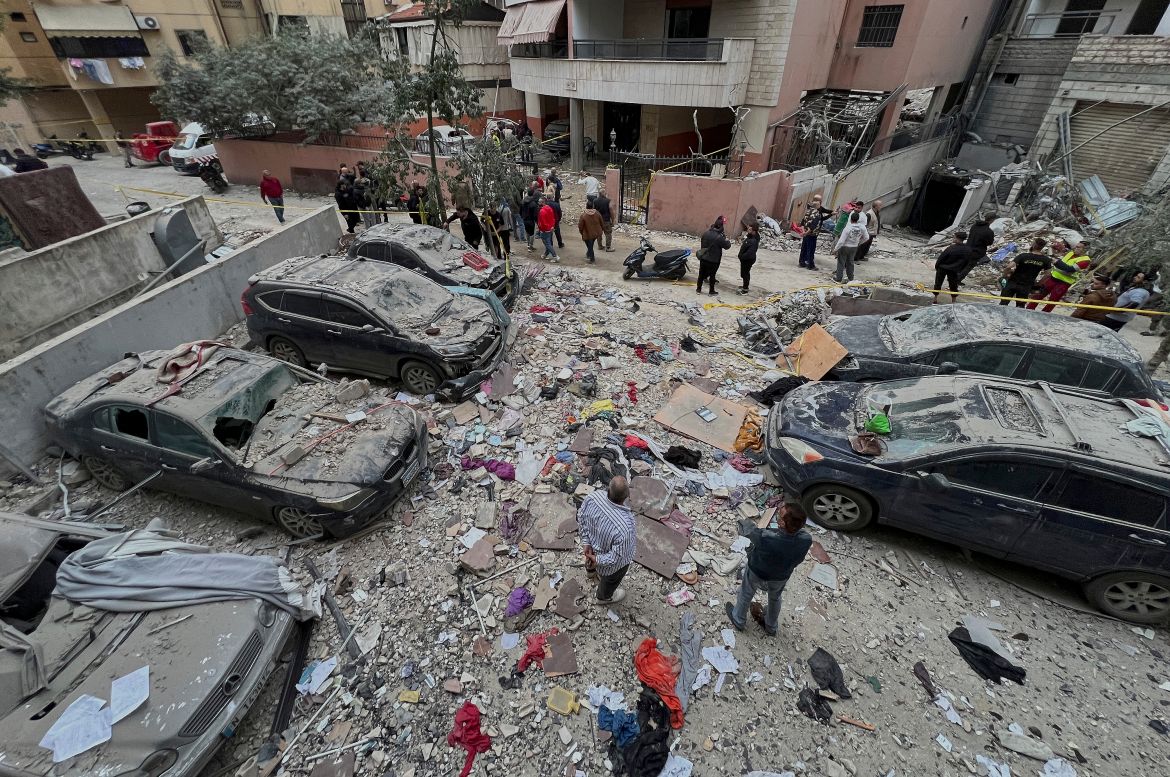In the heart of Lagos, where vibrant fabrics line the stalls of bustling markets, most people see only business opportunities. But for Sidikat Folami, the founder of Mateen Lander, it’s a different story. She sees an escalating crisis of textile waste—alongside an immense opportunity for transformation. What started as a childhood curiosity has evolved into a bold mission to reshape how Nigerians perceive and handle textile waste.
A Childhood Marked by Ingenuity
Born in Kaduna in 1983 to parents from Ijebu-Mushin, Ogun State, Folami grew up as an observant and deep-thinking child, always looking for innovative ways to solve problems. Her mother often joked about her unique way of thinking, playfully calling her a “witch”—not in a negative sense, but as someone who could see potential where others saw nothing. This blend of creativity and responsibility would later define her approach to waste management.
“I’ve always been very conscious of my environment. Growing up, people described me as mature beyond my years, and it frustrated me because I was just being myself,” she shared in an interview with TheCable.
Her early exposure to sewing came from watching her mother mend torn clothes at home. But it was a trip to Lagos in the mid-1990s that ignited a deeper passion. Watching her cousin take tailoring classes, she picked up a needle and thread and repurposed an old wrapper into a dress for her younger sister—unknowingly engaging in upcycling long before she understood the term.
“My journey into garment making started from childhood. My dad didn’t like torn clothes, so my mom handled all our repairs. We had a sewing machine at home, and I started experimenting. Between ages 13 and 16, I was constantly mending clothes,” she recalled.

Despite this early passion, Folami initially set her sights on a career in pharmacy or clinical psychology. But life had other plans. After surviving multiple crises in northern Nigeria, her family relocated to Ibadan, where she pursued a diploma in Library and Information Science at Olabisi Onabanjo University, followed by a graduate diploma in Data Processing Management.
Yet, fashion remained close to her heart. By 2008, she made a decisive choice—not to seek employment but to create opportunities for others. She trained in tailoring, refined her skills, and in February 2009, launched O’Raybour FashionFrica. That same year, she relocated to Lagos, marking the beginning of her entrepreneurial journey.
From Fashion to Textile Waste Management
For years, Folami ran a thriving business, catering to affluent clients in Nigeria and abroad. But something kept bothering her—the sheer amount of textile waste her operations were generating. Every new design led to fabric off-cuts, and even scraps she donated eventually ended up in landfills.
The global textile industry is one of the most environmentally damaging, responsible for about 10% of global emissions and 20% of wastewater production. An estimated 92 million tonnes of textile waste is produced annually, with textiles making up nearly 5% of all landfill waste. In Nigeria, the numbers are just as alarming. In 2024, the Lagos Waste Management Authority (LAWMA) reported that 85% of textile waste in the state was dumped in landfills. Meanwhile, Lagos produces about 2,000 tonnes of textile waste daily, most of which is discarded rather than repurposed.
“In Nigeria’s fashion industry, new clothes are made every day, and off-cuts are constantly piling up. Even as a bulk garment supplier to companies in the UK and US, I saw waste accumulating and kept wondering—what could be done with all of this?” she said.
At the time, she wasn’t fully aware of sustainability or how it connected to her business, but she knew there had to be a better way. By 2019, her curiosity about textile recycling deepened. Inspired by how plastic waste was being repurposed into useful products, she wondered if textiles could undergo a similar process.
Her breakthrough moment came in 2022 when she attended several sustainability and recycling events. A conversation with Olusola Idowu of Fashion Revolution helped her shift focus from plastic waste to textiles.
“Olusola introduced me to their programmes and helped me see textile waste management differently. That was when everything clicked,” she explained.
In January 2023, she co-founded FabriThread—a project with eight women dedicated to breaking down textile waste into raw materials for industrial use. By 2024, she officially launched Mateen Lander Limited.
Pioneering Textile Recycling in Nigeria

Globally, less than 1% of textiles are recycled into new products. While upcycling—turning waste fabric into new designs—is gaining traction in Nigeria, large-scale textile recycling remains almost nonexistent.
Through Mateen Lander, Folami is changing that. Her company specializes in fiberizing textile waste, breaking it down into raw fibers that can be used in construction, automotive manufacturing, and eco-friendly product development. Mateen Lander collects waste from households, garment manufacturers, and textile factories, with collection centers in Ajah, Yaba, and Badagry.
Since August 2024, the company has diverted over 35 tonnes of textile waste from landfills, repurposing them for industrial use.
However, the road hasn’t been easy. “Funding is a major issue. Textile recycling is expensive,” she admitted. The industry also faces a knowledge gap—many potential buyers don’t realize the value of recycled textile fibers.
“We need better funding and incentives to relieve some of the burden. Equipment and logistics are costly, but our priority is long-term sustainability. We’ve studied the market and know this journey requires patience,” she said.
Despite these challenges, Mateen Lander has secured critical partnerships. It is now the official material recovery partner for textile waste in Lagos through the Office of the Special Adviser on Climate Change and Circular Economy (OCCE).
“Our partnership with Titilayo Oshodi, the special adviser to the Lagos governor on climate change and circular economy, has been instrumental. It has helped us with advocacy and visibility,” she noted.
Additionally, the Global Cleantech Innovation Programme by the United Nations Industrial Development Organization (UNIDO) has provided training, while BASF West Africa has supported efforts to improve fiber quality.
Building a Circular Economy
Folami understands that solving Nigeria’s textile waste crisis requires large-scale solutions, not just small initiatives. One of her key goals is to attract industrial off-takers—businesses willing to purchase recycled textiles in bulk.
“Small buyers exist, but we need large-scale offtakers to make real impact. We’re actively connecting with industries that can use these recycled materials,” she explained.
Beyond that, she envisions an ecosystem where multiple players contribute to a circular economy.
“Mateen Lander can’t do it alone. We need entrepreneurs, innovators, and businesses to participate in textile recycling,”she added.
Empowering Women Through Waste-to-Wealth Initiatives
Beyond sustainability, Folami is deeply invested in empowering women. Through her waste-to-wealth initiatives, she trains women in waste management, equipping them with the skills to generate income. Partnering with Lagos Women Run and the OCCE, her organization provides training and startup capital for women exploring sustainable fashion and textile recycling.
“Women are strong, but they need more support. Many are held back by gender stereotypes, and part of our initiative is to help them break those barriers,” she said.
Her efforts haven’t gone unnoticed. She has received several awards, including the UNIDO-GCIP Global Most Gender-Inclusive Business Award (2024) and the ELOY Sustainability and Environment Award (2024).
As the world marks the 2025 International Day of Zero Waste on March 30, Folami’s work is more relevant than ever. In a country where textile waste is often discarded or burned, she is proving that discarded fabrics can have a second life—and that sustainability, innovation, and economic empowerment can go hand in hand.








Leave a Reply